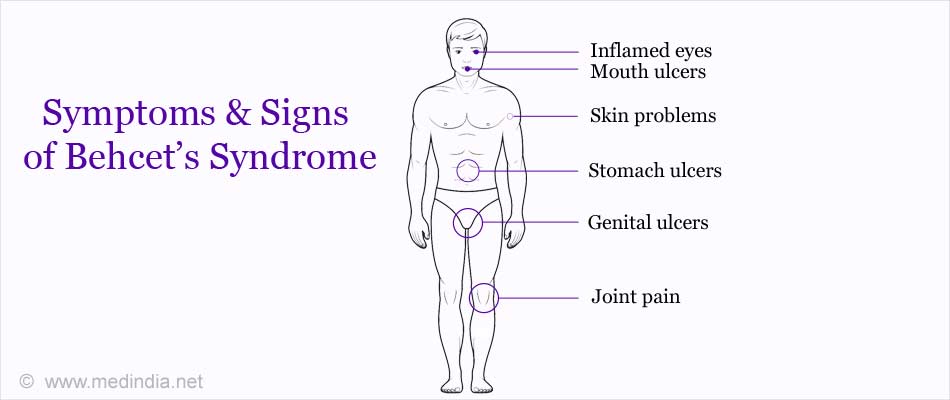What is behcet syndrome ?
BEHCET SYNDROME :
Behcet syndrome can create issues in your mouth and genital area , in the form of recurrent sores . This condition is mostly associated with inflammation of both the blood vessels and the eyes , though it often causes a lot of different issues throughout the body . Behcet disease , also known as Silk Road disease , is a chronic inflammatory condition, caused by vasculitis , which will affect and damage both your arteries and veins . The main common symptoms include painful sores on the muscous membranes of the mouth and other parts of the body, inflammation of parts of the eye , and arthritis . The sores can last from a few days , up to a week or more . Often , the symptoms come and go . Diagnosis is based on at least 3 episode of mouth sores in a year together with at least 2 of the following : genital sores, eye inflammation , skin sores, a positive skinprick test .
WHAT ARE THE CAUSES OF BEHCET'S SYNDROME ?
It may be an autoimmune disorder, meaning the body's immune system mistaken attacks healthy tissue with an inflammatory response . But ther are some people who have this gene marker who don't have Behcet disease . Researchers are studying other genes related to immune function and think that infection may play a role in triggering the disease in some people who have this gene marker have BEHCET'S DISEASE . Researchers are studying other genes related to immune function and think that infections may play a role in triggering the disease in some people who have genetic markers that predispose them to Behcet' s.
WHAT ARE THE SIGN & SYMPTOMS OF BEHCET SYNDROME ?
1. SKIN AND MUCOSA : Nearly all people with behcet disease present with some form of painful ulcerations inside the mouth . They are a form of aphthouss ulcers or non - scarring oral lesions . The oral lesion are similar to those found in inflammatory bowel disease and can be relapsing . Painful gential usually develop around the anus , vulva , or scrotum and cause scarring 75 % of the patients . Patients may present with erythema nodosum . cutaneous pustular vasculities , and lesions similar to pyoderma .
2. EYES : Inflammatory eye disease can develop early in the disease course and lead to permanent vision loss in 20 % of cases . Ocular involvement can be in the form of posterior uveitis , anterior uveitis , or retinal vasculities . A rare form of ocular involvement in this syndrome is retinal vasulitis which presents with painless decrease of vision with the possibility of floaters or visual feild defects .
Signs and symptoms of acute optic neuropathy include painless loss of vision which may affect either one or both eyes , reduced visual acuity , reduced color vision . swollen optic disc. Progressive optic atrophy may result in decreased visua; acuity or color vision .
3. BOWELS : Some patients with BD experience abdominal tenderness , bloating and general abdominal discomfort . When mild this can resemble irritable bowel syndrome , more severe cases bear similarities to inflammatory bowel disease such as ulcertive colitis or crohn's .
4. LUNGS : Lungs involvement is typically in the form of hemoptysis , pleuritis , cough , or fever and in severe cases can be life threatening if the outlet pulmonary artery develops an aneurysm which ruptures causing severe vasular collapse and death from bleeding in the lungs .
5. JOINTS : Arthritis is seen in up to half of people , and is usually a non-erosive poly or oligoarthritis primarily of the large joints of thr lower extremitis .
6. HEART : Chronic aortic regurgitation due to aortic root disease may also be seen .
7. BLOOD VESSELS : Blood vessel problems are observed in 7-29 of people with arterial lesion representing 15 % of vasular lesions . Arterial lesion pose a greater risk . Most common arterial lesion are occlusion or stenosis and aneurysms or pseudoaneurysms.
HOW TO TREAT BEHCET SYNDROME ?
Current treatment is aimed at easing the symptoms , reducing inflammation , and controlling the immune system . The quality of the evidence for treating the ulcers associated with Behcet disease , however is poor .
High dose corticosteroid therapy is often used for severe disease manifestation . Anti TNF therapy such as infliximab has shown promise in treating the uveitis associated with the disease . Apremilast may aslo be used to treat oral ulcers associated with behcet's disease. Thalidomide has alos been used due to its immune - modifying effect . in small studies to have beneficial results for mucocutaneous lesions .
The optimal treatment for acute optic neuropathy in behcet 's disease has not been used to its immune modifying effect Immunosuppressants such as intereron alpha and tumor necrosis factor antagonists may improve though not completely reverse symptoms of ocular behcet disease , which may progress over time despite treatment . when symptoms are limited to the anterior chamber of the eye prognosis is improved . Secondary optic nerve atrophy is frequently irreversible .



Comments
Post a Comment